Katey Schultz's Blog, page 15
August 14, 2014
Off the Grid
Brad and I took our first, real vacation since Flashes of War was published and escaped for 4 1/2 days to a small lake in Ontario. Thanks to the generosity of dear friend and author Anne-Marie Oomen and her husband David, we joined them at their two lakeside cabins that are off the grid and right up against the northern, undeveloped shore of a spring-fed lake about 20 miles from Sault Saint Marie. Much relaxation was had with long dinners, sauna sessions, lake swimming, fishing, paddling, and hours of silent reading. My body and mind were able to exhale and, as difficult as "re-entry" feels tonight, I'm able to close my eyes and easily conjure the peace of those four days. Here are a few snapshots or our time:
 Snapshot outside our cabin at Interlochen Center for the Arts on Green Lake.
Snapshot outside our cabin at Interlochen Center for the Arts on Green Lake.
 We crossed this 5-mile long, historic Mackinaw Bridge between Lake Michigan and Lake Huron, en route to the Upper Peninsula and Ontario.
We crossed this 5-mile long, historic Mackinaw Bridge between Lake Michigan and Lake Huron, en route to the Upper Peninsula and Ontario.
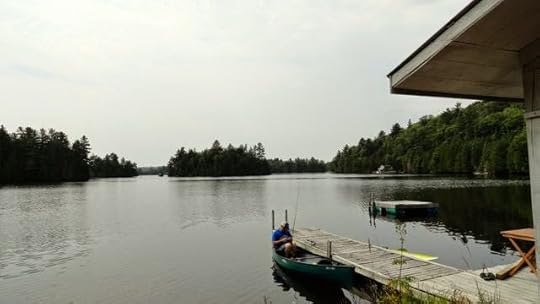 ...and arrived at David and Anne-Marie's private little spot on the water, off the grid.
...and arrived at David and Anne-Marie's private little spot on the water, off the grid.
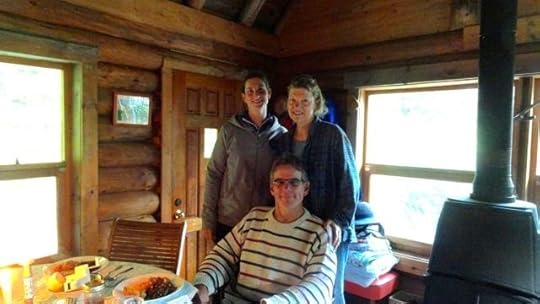 Dear friends, fine company, and all the warmth of a cabin with a woodstove.
Dear friends, fine company, and all the warmth of a cabin with a woodstove.
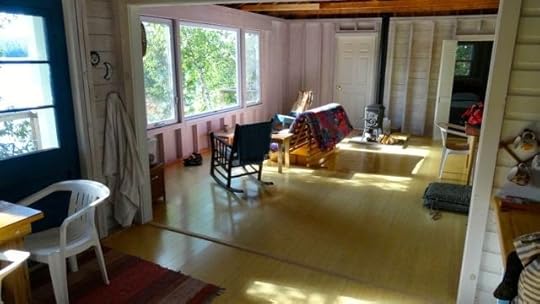 The Poet's Perch cabin we got to stay in for a few nights...
The Poet's Perch cabin we got to stay in for a few nights...
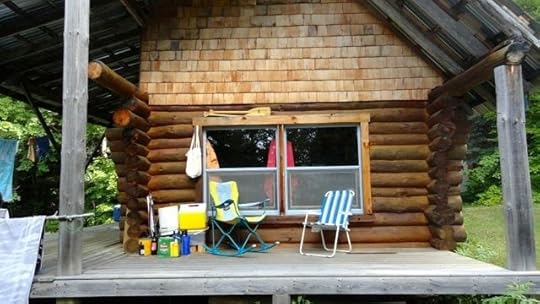 And our fave reading spot in the Bard's Cove cabin we stayed in on colder nights...
And our fave reading spot in the Bard's Cove cabin we stayed in on colder nights...
 And one of my fave things about Lake Country--the parallel lines and patterns
And one of my fave things about Lake Country--the parallel lines and patterns
between water and sky.
 Snapshot outside our cabin at Interlochen Center for the Arts on Green Lake.
Snapshot outside our cabin at Interlochen Center for the Arts on Green Lake.
 We crossed this 5-mile long, historic Mackinaw Bridge between Lake Michigan and Lake Huron, en route to the Upper Peninsula and Ontario.
We crossed this 5-mile long, historic Mackinaw Bridge between Lake Michigan and Lake Huron, en route to the Upper Peninsula and Ontario.
 ...and arrived at David and Anne-Marie's private little spot on the water, off the grid.
...and arrived at David and Anne-Marie's private little spot on the water, off the grid.
 Dear friends, fine company, and all the warmth of a cabin with a woodstove.
Dear friends, fine company, and all the warmth of a cabin with a woodstove.
 The Poet's Perch cabin we got to stay in for a few nights...
The Poet's Perch cabin we got to stay in for a few nights...
 And our fave reading spot in the Bard's Cove cabin we stayed in on colder nights...
And our fave reading spot in the Bard's Cove cabin we stayed in on colder nights...
 And one of my fave things about Lake Country--the parallel lines and patterns
And one of my fave things about Lake Country--the parallel lines and patternsbetween water and sky.
Published on August 14, 2014 05:00
August 9, 2014
Telling Their Stories
It never ceases to amaze me how these groups come together in their own unique way, summer after summer. Last week was my fourth experience teaching memoir to adults at Interlochen College of Creative Arts, and while each group is different there are some things that always remain the same: People are kind. People are brave. People surprise each other with their assumptions. People open up to new beliefs. People start to identify as writers. People take deep breaths at the end of the week, lift their gazes to the audience, and read out loud--sometimes for the first time in their lives.
Stories ranged from well-written anecdotes describing a scene from class, to pondering the suicide of a childhood friend, to the "travel years" of youth on a fishing boat. Participants considered siblings and parents, moves across the country, past loves and good, old fashioned, outside games played for hours as children. In all cases, they worked to employ descriptive and sensory detail, paying particular attention to the balance between scene, summary, and reflection. If a line-level or big-picture metaphor found its way into their work--as it frequently did--all the better.
One could almost write a recipe for our adventures: Take a sampling of strangers from across the country, put them in a room, shake them up with a lessons on literary technique, stir in some life stories, wrap them in a beautiful campus full of music and art, then cook for 5 days at a temperature slightly warmer than perfect.
Check in every once in a while to see if the juices are flowing, the words are crisping, and there's circulation through the major think-patterns in the brain.
Turn up the temperature a little more by setting the timer with a deadline.
Just before the deadline, sprinkle in some spices by allowing for critique from other writers as work is shared, reviewed, and revised.
When the timer goes off: cheer, smile, and celebrate. Enjoy a long, leisurely meal together. Toast the creative spirit! Find inspiration in the possibilities to come!
 ICCA Memoir Class, Summer 2014
ICCA Memoir Class, Summer 2014
Stories ranged from well-written anecdotes describing a scene from class, to pondering the suicide of a childhood friend, to the "travel years" of youth on a fishing boat. Participants considered siblings and parents, moves across the country, past loves and good, old fashioned, outside games played for hours as children. In all cases, they worked to employ descriptive and sensory detail, paying particular attention to the balance between scene, summary, and reflection. If a line-level or big-picture metaphor found its way into their work--as it frequently did--all the better.
One could almost write a recipe for our adventures: Take a sampling of strangers from across the country, put them in a room, shake them up with a lessons on literary technique, stir in some life stories, wrap them in a beautiful campus full of music and art, then cook for 5 days at a temperature slightly warmer than perfect.
Check in every once in a while to see if the juices are flowing, the words are crisping, and there's circulation through the major think-patterns in the brain.
Turn up the temperature a little more by setting the timer with a deadline.
Just before the deadline, sprinkle in some spices by allowing for critique from other writers as work is shared, reviewed, and revised.
When the timer goes off: cheer, smile, and celebrate. Enjoy a long, leisurely meal together. Toast the creative spirit! Find inspiration in the possibilities to come!
 ICCA Memoir Class, Summer 2014
ICCA Memoir Class, Summer 2014
Published on August 09, 2014 05:00
August 4, 2014
Making Meaning of Our Memories
I'm very excited to be at Interlochen for the 5th summer in a row and my 4th time teaching a course that is very near and dear to my heart: Making Meaning of Our Memories. This is a 4 1/2 day residential memoir writing retreat for writers of all levels and has proven, year after year, to culminate with a hugely moving participant reading on the last day, followed by what can lead to years of meaningful connection and continued work as writers. I was very excited to meet my new "students" (better known as adult participants) this afternoon and am sure we'll have a full, intense, rewarding week. Last summer, I was treated to a classroom full of 16 women who bonded very quickly and uniquely. Although I miss that, I'm happy to have a bit more gender balance this year and it's always neat when a married couple or returning participant signs up, too, for added layers of learning and conversation.
Brad's having the fishing vacation of his life while I'm working away, but evenings we have a sweet little cabin on the lake (courtesy Interlochen College of Creative Arts) and friends have pooled resources to help by loaning us a car and a kayak. Is it too much to hope for a little time to complete my own writing prompts and assignments throughout the week while I prep for teaching? We shall see...
Meantime, if you can't make it to Interlochen for classes (or you tried to sign up and got put on the waiting list), please consider my Writer at Large Services. I've opened registration to my current students and extend that offer to readers of this blog post. In two weeks, I'll make a broader media push, but there are limited spaces so please do reach out if you'd like to work together. And if you live locally, consider joining us for my free public reading this Wednesday, August 6th at 7:30pm in DeRoy Commons on Interlochen Campus.
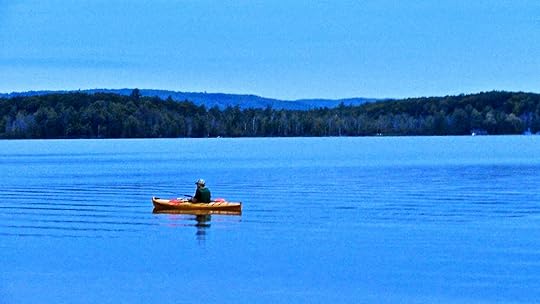 Brad on the water.
Brad on the water.
Brad's having the fishing vacation of his life while I'm working away, but evenings we have a sweet little cabin on the lake (courtesy Interlochen College of Creative Arts) and friends have pooled resources to help by loaning us a car and a kayak. Is it too much to hope for a little time to complete my own writing prompts and assignments throughout the week while I prep for teaching? We shall see...
Meantime, if you can't make it to Interlochen for classes (or you tried to sign up and got put on the waiting list), please consider my Writer at Large Services. I've opened registration to my current students and extend that offer to readers of this blog post. In two weeks, I'll make a broader media push, but there are limited spaces so please do reach out if you'd like to work together. And if you live locally, consider joining us for my free public reading this Wednesday, August 6th at 7:30pm in DeRoy Commons on Interlochen Campus.
 Brad on the water.
Brad on the water.
Published on August 04, 2014 05:00
July 31, 2014
In Training
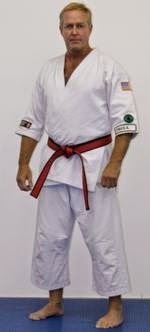 O Sensei RoenschThere was a time I considered myself "in training." At the peak of my martial arts practice, I spent 10-12 hours a week with an enlightened, sanctioned, holisitic teacher (Hanshi Roensch) training in mind, body, and spirit. I even travelled for weekend conferences and occasionally assisted fellow karateka if work was needed around the dojo. If I could have quit everything and become a "dojo rat," I would have. For three years, I became utterly hooked.
O Sensei RoenschThere was a time I considered myself "in training." At the peak of my martial arts practice, I spent 10-12 hours a week with an enlightened, sanctioned, holisitic teacher (Hanshi Roensch) training in mind, body, and spirit. I even travelled for weekend conferences and occasionally assisted fellow karateka if work was needed around the dojo. If I could have quit everything and become a "dojo rat," I would have. For three years, I became utterly hooked.Those years, "in training" felt like the most honest way to describe my fond, fierce, and focused efforts in the art of traditional Japanese karate. (Here's a brief, narrative history of that training.) More than any other mentor in my life, my teacher inspired an appreciation of the mind, body, and spirit connection. I have not forgotten his gift and aspire to train with such integrity in all areas of my life today. It's an ongoing process.
Recently, I blogged about needing something more to balance my work and writing life and have since decided to train for a 10K. As if my upcoming backpacking trip to circumnavigate Mt. Rainier (93 miles in 9 days) weren't enough...But still...physical exercise gets me out of my hyperactive brain and into a cooler state of mind more effectively than any other activity. Make no mistake; this 5'10", curvy, strong, slightly overweight woman is actually built for physical activity. But running is one of the least "body friendly" pursuits I could have chosen. If I stop too long and consider past injuries (1 bone surgically removed from each foot due to stress fracture and dislocation, 1 broken fibula, 1 broken metatarsal, countless torn ankle ligaments, chronic left ankle sprains, left lateral meniscus deterioration, patellar cartilage wear...which is to say nothing of the other regions--cracked ribs, 2 concussions, broken finger...), I could very easily talk myself out of this. But if I likewise consider the reasons I want to be "in training" again, it's an easy decision.
Having a physical challenge to set my sights on, much like martial arts, allows me to apply my best focus and determination on something other than writing and business. I can take what works for me day in and day out and apply it in a wholly other realm. This teaches me more than I ever anticipate, helping shape my character and enabling me to challenge myself. I can't continue to train with my martial arts teacher, but I can continue to learn from all he taught me. So much of what I do at the desk is intangible. No one can see the people I make up in stories. My business may be going strong, but no one can actually measure influence and coaching, as I work with adult writers across the country. But a timed 6.2 mile run? Now that's something I can practice, improve upon, learn from, and ultimately achieve.
Inspired by this training regimen published in Outside Magazine, I began the 10K work two weeks ago. Last Saturday I was supposed to run for 1hr5mins. I did...and when I looked down at my FitBit Zip and saw how close I was to hitting 6.2 miles, I kept going. The next day? I felt tenderness in my feet and knees where past injuries have occurred; but no pain. Nothing out of the ordinary. More importantly--everything else inside of me felt great. I could only think of the upcoming week and how I could balance strength training, diet, and rest with small bursts of cardio that might help me by the next weekend...when perhaps I could run a 10K again. Just to see. Just to find out...
Published on July 31, 2014 05:00
July 28, 2014
Writing Out of Order
I spent yesterday afternoon with beloved poet, mentor, and friend Mendy Knott. She blogs at Hillpoet and if you're looking for powerful, practical advice on creativity, her site is a great resource. Mendy guided me most especially during the year I transitioned between being a full time teacher to applying to graduate school in writing. She left North Carolina for some years after that, but 'round about the time I came off the road and back into the valley, she returned. Now, we're just a few miles apart!
What I love most about deep conversations with artists of any medium, are the parallels we can find in our creative processes and challenges. Our conversation wound around through topics such as ritual, putting work in the drawer, exhaustion, and having fun. When I told Mendy that I knew my re-approach to the novel this coming September would be difficult--that I'd probably begin with hours and hours at the desk and not a single word to show for it--we started talking about how hard it can be to return to a project after you've pushed it too far or too hard. For my part, I know I've put too much pressure on myself to make the novel not only something I feel good about, but that can boost my career and earn me an advance from a larger publishing house. That pressure has proven to work against my creative drive and isn't in the true spirit of writing anyway. I've always done my best work when I'm "just exploring." When there's nothing at stake. When I'm unattached to the outcome.
I told Mendy that when I think about the novel in general, I'm not excited about getting back into it. Of course, I'm excited to have my writing mornings back again, no matter how hard they feel at first. But the novel itself--meh. However, there are scenes, I told her, that I really believe in. There are moments I'm excited to go back to and rip apart or expand or lift entirely out of the timeline and put them someplace else. As I spoke the words, I could almost feel that little pulse of the buzz-drunk writer in me; you know--that feeling you have when you get an idea and even if you're in the middle of showering or talking to someone in the grocery store, you can't concentrate on anything else until you get that idea down on paper.
"Write those first," Mendy said. And of course, as soon as she said it I knew she was absolutely right. Wasn't she the same writer, mentor, and friend who told me to "go where your heart feels lightest" a few years back when I had to make a big decision? Yes, yes she was. And here was that same advice coming at me on a more specific, practical level that may well be the re-entry point to my novel.
To do this--to write the scenes that excite me the most and that contain the most wonder for me--I'll have to write out of order. I have never been able to write out order. Not in fiction, not in nonfiction, and not in poetry. I get on a track and I stick to it. Even if I rapidly change desires or obstacles or even point of view, I'm never apt to stop what I'm doing and skip tracks entirely to explore a scene or a moment that isn't grounded in what came before. Many writers write out of order, though, and swear by it. Some can't do anything in order for that matter, and the bulk of their revision time is spend ordering, re-shaping, re-ordering, and tying up loose or un-clarified ends.
So I've got an entry point. I'm going to start with the scenes that excite me the most; the scenes that I wonder about more than any others. The scenes that have unanswered questions for me or that feel like very rich territory. They'll be drafted out of order and I may not even use what I write. I'm going to write around the novel, in a way, and just see what I stumble upon. If it works out, it works out; but even if I trash every word that I write, those words will still work in a background chorus to inform the eventual words that do stick and make it through a final draft. The final draft? The final draft. Phew. Now that's a thought...
What I love most about deep conversations with artists of any medium, are the parallels we can find in our creative processes and challenges. Our conversation wound around through topics such as ritual, putting work in the drawer, exhaustion, and having fun. When I told Mendy that I knew my re-approach to the novel this coming September would be difficult--that I'd probably begin with hours and hours at the desk and not a single word to show for it--we started talking about how hard it can be to return to a project after you've pushed it too far or too hard. For my part, I know I've put too much pressure on myself to make the novel not only something I feel good about, but that can boost my career and earn me an advance from a larger publishing house. That pressure has proven to work against my creative drive and isn't in the true spirit of writing anyway. I've always done my best work when I'm "just exploring." When there's nothing at stake. When I'm unattached to the outcome.
I told Mendy that when I think about the novel in general, I'm not excited about getting back into it. Of course, I'm excited to have my writing mornings back again, no matter how hard they feel at first. But the novel itself--meh. However, there are scenes, I told her, that I really believe in. There are moments I'm excited to go back to and rip apart or expand or lift entirely out of the timeline and put them someplace else. As I spoke the words, I could almost feel that little pulse of the buzz-drunk writer in me; you know--that feeling you have when you get an idea and even if you're in the middle of showering or talking to someone in the grocery store, you can't concentrate on anything else until you get that idea down on paper.
"Write those first," Mendy said. And of course, as soon as she said it I knew she was absolutely right. Wasn't she the same writer, mentor, and friend who told me to "go where your heart feels lightest" a few years back when I had to make a big decision? Yes, yes she was. And here was that same advice coming at me on a more specific, practical level that may well be the re-entry point to my novel.
To do this--to write the scenes that excite me the most and that contain the most wonder for me--I'll have to write out of order. I have never been able to write out order. Not in fiction, not in nonfiction, and not in poetry. I get on a track and I stick to it. Even if I rapidly change desires or obstacles or even point of view, I'm never apt to stop what I'm doing and skip tracks entirely to explore a scene or a moment that isn't grounded in what came before. Many writers write out of order, though, and swear by it. Some can't do anything in order for that matter, and the bulk of their revision time is spend ordering, re-shaping, re-ordering, and tying up loose or un-clarified ends.
So I've got an entry point. I'm going to start with the scenes that excite me the most; the scenes that I wonder about more than any others. The scenes that have unanswered questions for me or that feel like very rich territory. They'll be drafted out of order and I may not even use what I write. I'm going to write around the novel, in a way, and just see what I stumble upon. If it works out, it works out; but even if I trash every word that I write, those words will still work in a background chorus to inform the eventual words that do stick and make it through a final draft. The final draft? The final draft. Phew. Now that's a thought...
Published on July 28, 2014 05:00
July 24, 2014
Testing the Gear
Along with a few thousand other people, my friends and I put in for a permit to hike The Wonderland Trail, a 93-mile loop that circumnavigates Mt. Rainier. In a random lottery drawing, our names were drawn and we got the permit! Ever since we got the news a few months ago, we've been training. The hike will average just 10 miles per day, but with massive elevation changes and high likelihood of rain, even the most fit hikers are well-advised to plan and prepare for this kind of trek. We'll depart late August and come back just after Labor Day.
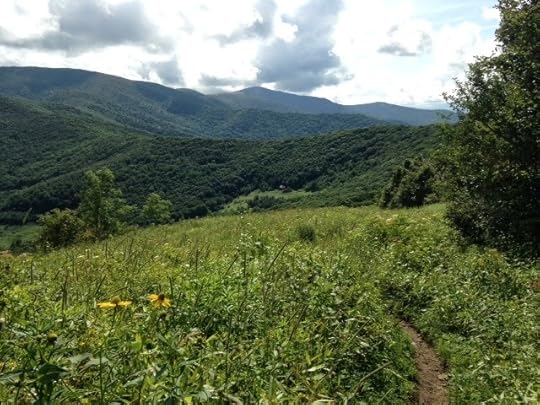 Hiking the Roan highlands to reach the highest point of the Appalachian Trail this week.To that end, I took 2 days/1 night off this week to hike 22 miles on the nearby Appalachian trial with two friends who will also go on The Wonderland trip. Out there in the clouds, we soaked ourselves with our own sweat (thanks to 90% humidity) and by day's end our skin was salty enough for a horse to lick. But the clouds parted as we crossed the Roan highlands and grassy balds. I've hiked this stretch of the trail probably half a dozen times since moving to Western North Carolina and it never ceases to inspire. I feel so fortunate that it's all less than an hour away.
Hiking the Roan highlands to reach the highest point of the Appalachian Trail this week.To that end, I took 2 days/1 night off this week to hike 22 miles on the nearby Appalachian trial with two friends who will also go on The Wonderland trip. Out there in the clouds, we soaked ourselves with our own sweat (thanks to 90% humidity) and by day's end our skin was salty enough for a horse to lick. But the clouds parted as we crossed the Roan highlands and grassy balds. I've hiked this stretch of the trail probably half a dozen times since moving to Western North Carolina and it never ceases to inspire. I feel so fortunate that it's all less than an hour away.
The best part? Taking two full days off--no work at night, no computers, no phone--felt like an incredibly long time. When I'm not cramming my days with trying to learn new balance and new negotiations in my professional and personal life, time stretches out wonderfully. I'm aiming for more of this feeling in the future for both work days and personal days and telling myself it just takes practice, right? I practiced over-productivity for a long time and it got me far, but it cost something. Slow and steady, I'm trying to gain some of that back.
As far as the gear goes, most of what I have works top-notch for my needs, but I learned we'll want a gravity-fed water filtration system (rather than a pump) for a group hike, and that I'll need Trader Joe's chili-spiced dried mango en masse to get me through. For trailside indulgence? Whiskey and a 1.5 pound crazy creek chair.
 Hiking the Roan highlands to reach the highest point of the Appalachian Trail this week.To that end, I took 2 days/1 night off this week to hike 22 miles on the nearby Appalachian trial with two friends who will also go on The Wonderland trip. Out there in the clouds, we soaked ourselves with our own sweat (thanks to 90% humidity) and by day's end our skin was salty enough for a horse to lick. But the clouds parted as we crossed the Roan highlands and grassy balds. I've hiked this stretch of the trail probably half a dozen times since moving to Western North Carolina and it never ceases to inspire. I feel so fortunate that it's all less than an hour away.
Hiking the Roan highlands to reach the highest point of the Appalachian Trail this week.To that end, I took 2 days/1 night off this week to hike 22 miles on the nearby Appalachian trial with two friends who will also go on The Wonderland trip. Out there in the clouds, we soaked ourselves with our own sweat (thanks to 90% humidity) and by day's end our skin was salty enough for a horse to lick. But the clouds parted as we crossed the Roan highlands and grassy balds. I've hiked this stretch of the trail probably half a dozen times since moving to Western North Carolina and it never ceases to inspire. I feel so fortunate that it's all less than an hour away.The best part? Taking two full days off--no work at night, no computers, no phone--felt like an incredibly long time. When I'm not cramming my days with trying to learn new balance and new negotiations in my professional and personal life, time stretches out wonderfully. I'm aiming for more of this feeling in the future for both work days and personal days and telling myself it just takes practice, right? I practiced over-productivity for a long time and it got me far, but it cost something. Slow and steady, I'm trying to gain some of that back.
As far as the gear goes, most of what I have works top-notch for my needs, but I learned we'll want a gravity-fed water filtration system (rather than a pump) for a group hike, and that I'll need Trader Joe's chili-spiced dried mango en masse to get me through. For trailside indulgence? Whiskey and a 1.5 pound crazy creek chair.
Published on July 24, 2014 05:00
July 21, 2014
It's Perfectly Normal
I ran into a respected author at the gym yesterday. She happens to live in the same valley as I do, just across the river. She'd just returned from a trip to Europe, where she was able to complete some research for her next book. We chatted on neighboring elliptical runners, arms swaying and feet stepping. She asked how my novel was coming along.
 "It's in the drawer," I said, then braced for what I thought might come next. Surely, she'd ask when I'll take it out, what chapter I'll start working on when I begin again. At least, I assumed, she'd ask how long it had been sitting in the drawer.
"It's in the drawer," I said, then braced for what I thought might come next. Surely, she'd ask when I'll take it out, what chapter I'll start working on when I begin again. At least, I assumed, she'd ask how long it had been sitting in the drawer.
"In the drawer," she said. And then I saw the slightest, knowing nod of her chin. No questions followed. No look of concern crossed her forehead. We strode in mid-air, ellipticals humming, and something like understanding passed between us.
We huffed through a dozen more paces--long enough for me to get distracted by the wolverine tween flick playing on the big screens against the far wall--and then I spoke up. "I keep fantasizing about writing for travel magazines or training for a 10K or just going back to my old, fun, short stories from before..."
"Oh," she said. "Oh. It's completely normal, you know...feeling that way."
"I don't want to work on it at all. I don't want to touch it. I don't like it." I didn't have to say the word, that dirty word--novel--for her to know exactly what I was talking about. Furthermore, I didn't have to explain what "from before" meant. Before the book tour, before knowing what I know now about industry and craft, before the high stakes I put on myself, before...before...before...
"I'd be worried about you if you did want to get back into it," she said. "Not liking it is part of the process. Everyone has to go through that. It's good that you put it away."
The machine beeped at me, cueing the end of my workout. I hopped off and took a few wobbly, awkward first steps. It's always so strange walking on solid ground after hovering somewhere between weightlessness and enduring muscles. Those first steps--hard earned, disorienting, and part of the deal. The analogy was not lost on me as the author and I made plans to get together in September. My steps might have teetered whenI turned to walk away, but at least I knew it was normal. That, like always, I'd find my footing again soon enough.
 "It's in the drawer," I said, then braced for what I thought might come next. Surely, she'd ask when I'll take it out, what chapter I'll start working on when I begin again. At least, I assumed, she'd ask how long it had been sitting in the drawer.
"It's in the drawer," I said, then braced for what I thought might come next. Surely, she'd ask when I'll take it out, what chapter I'll start working on when I begin again. At least, I assumed, she'd ask how long it had been sitting in the drawer."In the drawer," she said. And then I saw the slightest, knowing nod of her chin. No questions followed. No look of concern crossed her forehead. We strode in mid-air, ellipticals humming, and something like understanding passed between us.
We huffed through a dozen more paces--long enough for me to get distracted by the wolverine tween flick playing on the big screens against the far wall--and then I spoke up. "I keep fantasizing about writing for travel magazines or training for a 10K or just going back to my old, fun, short stories from before..."
"Oh," she said. "Oh. It's completely normal, you know...feeling that way."
"I don't want to work on it at all. I don't want to touch it. I don't like it." I didn't have to say the word, that dirty word--novel--for her to know exactly what I was talking about. Furthermore, I didn't have to explain what "from before" meant. Before the book tour, before knowing what I know now about industry and craft, before the high stakes I put on myself, before...before...before...
"I'd be worried about you if you did want to get back into it," she said. "Not liking it is part of the process. Everyone has to go through that. It's good that you put it away."
The machine beeped at me, cueing the end of my workout. I hopped off and took a few wobbly, awkward first steps. It's always so strange walking on solid ground after hovering somewhere between weightlessness and enduring muscles. Those first steps--hard earned, disorienting, and part of the deal. The analogy was not lost on me as the author and I made plans to get together in September. My steps might have teetered whenI turned to walk away, but at least I knew it was normal. That, like always, I'd find my footing again soon enough.
Published on July 21, 2014 05:00
July 17, 2014
Reading Like a Writer
 (source)I spent a few short days in Boston last week as a guest to the Solstice MFA in Writing at Pine Manor College program. Although I've taught students with graduate degrees before, it was my first "official" invite to such a program and therefore my first time teaching an all-graduate level writing course. To my anticipation, the opportunity did not disappoint. During my "Flash Fiction in a Flash" craft class, I found immediately that the students were "reading like writers." They could engage with the text on micro and macro levels that helped them go deep very quickly. This, in turn, fueled conversation about technique, impact, escalation, and effectiveness in writing.
(source)I spent a few short days in Boston last week as a guest to the Solstice MFA in Writing at Pine Manor College program. Although I've taught students with graduate degrees before, it was my first "official" invite to such a program and therefore my first time teaching an all-graduate level writing course. To my anticipation, the opportunity did not disappoint. During my "Flash Fiction in a Flash" craft class, I found immediately that the students were "reading like writers." They could engage with the text on micro and macro levels that helped them go deep very quickly. This, in turn, fueled conversation about technique, impact, escalation, and effectiveness in writing.I also teach an annual, residential memoir workshop for adults (coming up next month at ICCA!), during which we discuss what it means to read like a writer. This skill matters no matter what genre you write in, and is just as important as your skills on the page. Of course, there are some very fine texts out there on this subject already--most notably, Francine Prose's Reading Like a Writer: A Guide for People Who Love Books and for Those Who Want to Write Them. For me, this concept can be expressed in its most basic terms by encouraging readers to pose questions to themselves: How did the writer achieve this impact? In what ways could I use those techniques to help readers make meaning of my own work? After all, we can't "control" how a reader will respond to our work, but we can (and should) suggest or imply certain outcomes by our very careful use of exactly the right words at the right time. Focusing on the how and the impact helps many writers make decisions about what to leave in, what to leave out, and why their particular story or essay may or may not be working in terms of effective impact on readers.
Last week also reminded me just how precious, memorable, invigorating, and exhausting the residencies on low-res MFA programs can be. Each time I rounded a corner on campus and encountered another scene--students talking passionately about workshop, faculty debating "tell it slant"--I found myself reminiscing about my own experiences in 2006, when my studies at Pacific University began. How highly I regarded those faculty writers! How in love with my advisors I felt! How much I needed my fellow students, and still remain close with some of them. Community is essential, but at times overwhelming--especially for introverted writers. The low-res model gives the best of both worlds; an abundance of acceptance and challenge a few times a year, cushioned by months of quiet, slow and steady privacy to get the job done.
I'm wishing all those Solstice students the best of luck as they continue (and a few graduate, today) and looking forward to connecting with a new group of memoir writers in a few weeks when #1 and I travel to Michigan. He's going to fish. I'm going to teach. Afterwards, we're hiding out in a log cabin in Canada for 4 days. He's going to fish. I'm going to read like a writer. And write like one, too.
Published on July 17, 2014 05:00
July 14, 2014
Something I'm Not in Charge Of
Trying to ponder and shift the balance of activities and obligations in my life has reminded me how important it is to have "something else" I'm passionate about, other than writing. The passion that got me through grad school was martial arts, which I blogged about, studied, and trained in to near obsession. I also putzed around with music a lot, singing informally with a group of women once a week. But more than anything else during that time in my life, the gift of walking into the dojo to train in body, mind, and spirit helped apply just the right amount of pressure and balance to my schedule. The results were a tired body and an open mind--perfectly suitable for long hours of sitting quietly at the desk, once I'd showered all the sweat and salt off. It also eased my mind greatly to know that each time I showed up to class, I wasn't in charge. No matter how my day had been or what gripe I might have had, my job was simply to do what I was told, to the best of my ability. I relished not being "in charge" and found freedom in the fact that nothing mattered but the physical and mental challenges put before me in that very moment.
When you're self-employed, those moments of not being in charge can never be underestimated. Day in and day out, you are your own boss and your own "employee of the month." You're constantly balancing those two roles. Your financial stability, your professional development, and your professional reputation depend upon your ability to manage both roles effectively. At the end of the day, you can step away--something I've been working on by trying not to work after dinnertime--but if you're like me, you then find yourself "in charge" of what do to with your evening. I read. I cook. I read some more. I try to stay away from email as it will pull me back into work mode. But even these things, at least right now, require conscious shaping and effort. Goodness! That book tour gave me some sort of multi-tasking-high-alert-obsessive-effectiveness disease!
I need a cure. If my martial arts instructor hadn't moved to Florida, I never would have stopped training. And while I'm quite disciplined at my own exercise plan each week, that's also exactly the problem--because I'm the one in charge of that discipline and after being in charge all day, the last thing I need is more of it. What can fill this space--Soccer? Training for a 10K? If I lived in a city, I could join a rec atheltics league. Perhaps I need some sort of extreme yoga? Whatever it is, it needs to involve community and accountability. Come wintertime, the two trail crews I volunteer for are really good for that. But here, now--what is there? I've made a goal to try and find out.
When you're self-employed, those moments of not being in charge can never be underestimated. Day in and day out, you are your own boss and your own "employee of the month." You're constantly balancing those two roles. Your financial stability, your professional development, and your professional reputation depend upon your ability to manage both roles effectively. At the end of the day, you can step away--something I've been working on by trying not to work after dinnertime--but if you're like me, you then find yourself "in charge" of what do to with your evening. I read. I cook. I read some more. I try to stay away from email as it will pull me back into work mode. But even these things, at least right now, require conscious shaping and effort. Goodness! That book tour gave me some sort of multi-tasking-high-alert-obsessive-effectiveness disease!
I need a cure. If my martial arts instructor hadn't moved to Florida, I never would have stopped training. And while I'm quite disciplined at my own exercise plan each week, that's also exactly the problem--because I'm the one in charge of that discipline and after being in charge all day, the last thing I need is more of it. What can fill this space--Soccer? Training for a 10K? If I lived in a city, I could join a rec atheltics league. Perhaps I need some sort of extreme yoga? Whatever it is, it needs to involve community and accountability. Come wintertime, the two trail crews I volunteer for are really good for that. But here, now--what is there? I've made a goal to try and find out.
Published on July 14, 2014 05:00
July 10, 2014
Considering Creativity: Muse, Failure, and Drive
I've enrolled in a 5-part online course sponsored by SynchCast called "Calling in Your Muse: Five Keys to a Creative Life." The first class was free and the others were offered at a great, early-bird registration price. Given all the change in my life lately--coming down from the book tour, living with Brad, getting engaged to Brad, re-structuring my business, balancing my budget as a self-employed author, and traveling once a month for book events--it seemed time for a wider perspective. I've agreed to put the novel away for the summer while I get a handle on my own exhaustion. I signed up for this course with the intention of getting help with that wider perspective. So far, I'm finding it really valuable.
Many folks have seen and heard about Elizabeth Gilbert's TED Talk on success, failure, and drive. This SynchCast course is along those same lines, but brings in different experts from different artistic mediums across the disciplines, including poet Ellen Bass, whom I received the original suggestion to enroll from. The first class is still free (click here and scroll down) and I highly recommend treating yourself to 90-minute of thought-provoking conversation.
Perhaps more than anything, what surprised me about this first conversation was the supporting artwork. In addition to superb tech support in real time, web cam or audio options, and chat options (it sounds overwhelming--it wasn't), images of supporting artwork and quotes were displayed during the live class. What I saw moved me greatly. I asked about the imagse later, messaging a tech support staff member at SynchCast. He reported that most of the images (all?) were in the public domain and he had found them through some such site for gathering and organizing imagery. Here are a few that particularly invited me to dream and wonder:

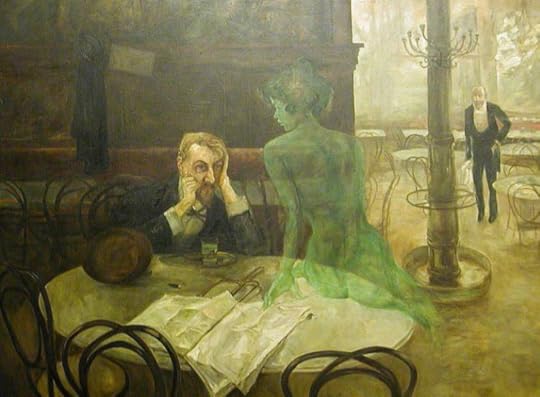
Experiencing my own response to these images--it was something like an exhale, a gift--I learned that I have not been giving myself enough time to dream and imagine in an unstructured setting. The simple invitation to look at an artistic image suddenly reminded me of something I'd forgotten in the burn-out-crash following the book tour, and that is that our best work as artists comes when we stop pushing and start allowing.
Sure, we have to remain disciplined, but it's possible to be disciplined and open at the same time. When considering the question "How can we make lightning strike?", the moderators of the first class effectively told viewers that we have to throw ourselves into the storm if we want lightning to strike. Or as Chuck Close said, "Inspiration is for amateurs. The rest of us have to work." In short, it takes work to be in the storm, to ride it out. It takes work to remain vulnerable and open, while also renouncing parts of the outside world and carving out time to do our best, most private work as artists. Like most good things in life, balance is key.
I also benefitted from one of the hosts' observations about the courage it takes to recognize and life through our personal creative challenges. "You have to have the courage to comprehend your own shadow," he said. He discussed a time when he couldn't write for three months. Despite the suffering and the doubts, the learning that came out of that "dry spell" propelled him and his writing further than ever before. But it's hard to live through that; hearing that it's a "natural" part of the process certainly helped.
Tonight's class will have a different guest and continue the exploration. I can't wait!
Many folks have seen and heard about Elizabeth Gilbert's TED Talk on success, failure, and drive. This SynchCast course is along those same lines, but brings in different experts from different artistic mediums across the disciplines, including poet Ellen Bass, whom I received the original suggestion to enroll from. The first class is still free (click here and scroll down) and I highly recommend treating yourself to 90-minute of thought-provoking conversation.
Perhaps more than anything, what surprised me about this first conversation was the supporting artwork. In addition to superb tech support in real time, web cam or audio options, and chat options (it sounds overwhelming--it wasn't), images of supporting artwork and quotes were displayed during the live class. What I saw moved me greatly. I asked about the imagse later, messaging a tech support staff member at SynchCast. He reported that most of the images (all?) were in the public domain and he had found them through some such site for gathering and organizing imagery. Here are a few that particularly invited me to dream and wonder:


Experiencing my own response to these images--it was something like an exhale, a gift--I learned that I have not been giving myself enough time to dream and imagine in an unstructured setting. The simple invitation to look at an artistic image suddenly reminded me of something I'd forgotten in the burn-out-crash following the book tour, and that is that our best work as artists comes when we stop pushing and start allowing.
Sure, we have to remain disciplined, but it's possible to be disciplined and open at the same time. When considering the question "How can we make lightning strike?", the moderators of the first class effectively told viewers that we have to throw ourselves into the storm if we want lightning to strike. Or as Chuck Close said, "Inspiration is for amateurs. The rest of us have to work." In short, it takes work to be in the storm, to ride it out. It takes work to remain vulnerable and open, while also renouncing parts of the outside world and carving out time to do our best, most private work as artists. Like most good things in life, balance is key.
I also benefitted from one of the hosts' observations about the courage it takes to recognize and life through our personal creative challenges. "You have to have the courage to comprehend your own shadow," he said. He discussed a time when he couldn't write for three months. Despite the suffering and the doubts, the learning that came out of that "dry spell" propelled him and his writing further than ever before. But it's hard to live through that; hearing that it's a "natural" part of the process certainly helped.
Tonight's class will have a different guest and continue the exploration. I can't wait!
Published on July 10, 2014 05:00



